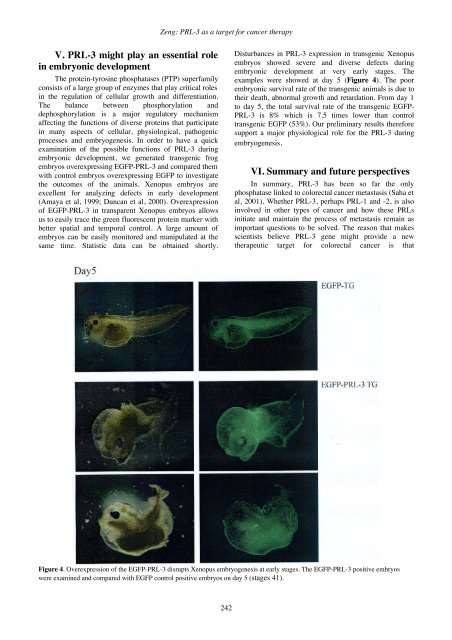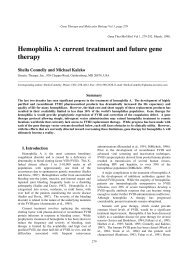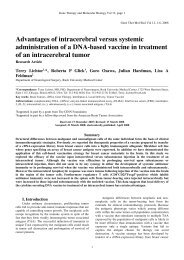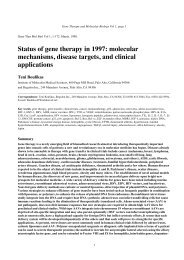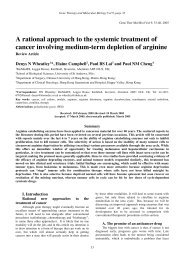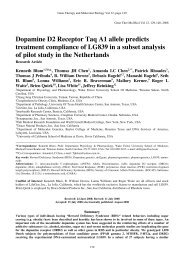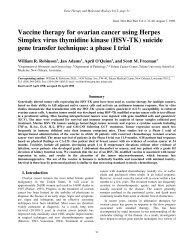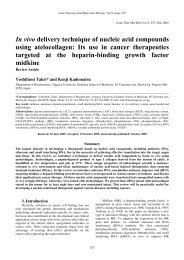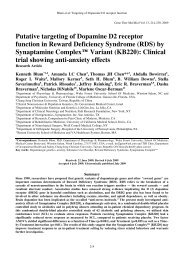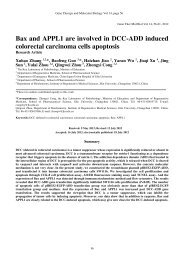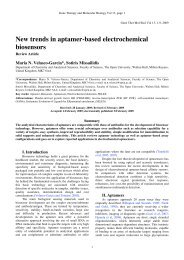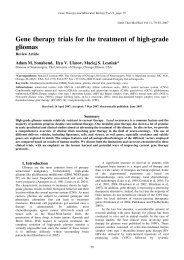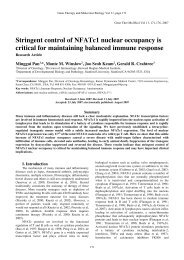Zeng: PRL-3 as a target for cancer therapyV. PRL-3 might play an essential rolein embryonic developmentThe protein-tyrosine phosphatases (PTP) superfamilyconsists of a large group of enzymes that play critical rolesin the regulation of cellular growth and differentiation.The balance between phosphorylation anddephosphorylation is a major regulatory mechanismaffecting the functions of diverse proteins that participatein many aspects of cellular, physiological, pathogenicprocesses and embryogenesis. In order to have a quickexamination of the possible functions of PRL-3 duringembryonic development, we generated transgenic frogembryos overexpressing EGFP-PRL-3 and compared themwith control embryos overexpressing EGFP to investigatethe outcomes of the animals. Xenopus embryos areexcellent for analyzing defects in early development(Amaya et al, 1999; Duncan et al, 2000). Overexpressionof EGFP-PRL-3 in transparent Xenopus embryos allowsus to easily trace the green fluorescent protein marker withbetter spatial and temporal control. A large amount ofembryos can be easily monitored and manipulated at thesame time. Statistic data can be obtained shortly.Disturbances in PRL-3 expression in transgenic Xenopusembryos showed severe and diverse defects duringembryonic development at very early stages. Theexamples were showed at day 5 (Figure 4). The poorembryonic survival rate of the transgenic animals is due totheir death, abnormal growth and retardation. From day 1to day 5, the total survival rate of the transgenic EGFP-PRL-3 is 8% which is 7.5 times lower than controltransgenic EGFP (53%). Our preliminary results thereforesupport a major physiological role for the PRL-3 duringembryogenesis.VI. Summary and future perspectivesIn summary, PRL-3 has been so far the onlyphosphatase linked to colorectal cancer metastasis (Saha etal, 2001). Whether PRL-3, perhaps PRL-1 and -2, is alsoinvolved in other types of cancer and how these PRLsinitiate and maintain the process of metastasis remain asimportant questions to be solved. The reason that makesscientists believe PRL-3 gene might provide a newtherapeutic target for colorectal cancer is thatFigure 4. Overexpression of the EGFP-PRL-3 disrupts Xenopus embryogenesis at early stages. The EGFP-PRL-3 positive embryoswere examined and compared with EGFP control positive embryos on day 5 (stages 41).242
<strong>Gene</strong> <strong>Therapy</strong> and <strong>Molecular</strong> <strong>Biology</strong> Vol 7, page 243most of the previously described genetic alterations incolorectal cancers involve inactivation of tumorsuppressor genes. It is difficult to target with drugs forinactive or absent genes in the cancers (Saha et al, 2001).In contrast, PRL-3 is elevated in cancer cells, whichprovides an excellent target for drug discovery purposes.By NMR resonance, the PRL-2 and -3 structures havebeen investigated (Kozlov et al, 2002; Zhou et al, 2003).Understanding of its structure, especially the catalyticdomain, may help us to search specific inhibitors for PRL-3 in the treatment of the colorectal metastases. We studieda catalytically inactive PRL-3 (C104S) mutant and foundthat it reduced effect on promoting cell migration (Zeng etal, 2003). Here, we suggest that the consensus phosphatasemotif might potentially be a therapeutic target. We alsosuggest that specific antibodies against each PRL areneeded to distinguish the expression and investigate theindividual roles of these closely related PTPs, which inturn may lead to new insights into cancer metastasis. Suchantibodies may also provide a platform for noveldiagnostic, prognostic or therapeutic approaches. Thefunctions of the PRLs-PTP family in cancer metastasisundoubtedly cannot be ignored.AcknowledgmentsI am very grateful to Yuen WH and Loh CB inTransgenic Frog Unit; Gan, BQ and Tang JP. in HistologyUnit from our Institute to provide excellent facilities tothis related work. I appreciate Drs. Tang BL and Yin XJfor critical reading of the article.ReferencesAmaya E, and Kroll KL (1999) A method for generatingtransgenic frog embryos. Methods Mol Biol 97, 393-414Cates CA, Michael RL, Stayrook KR, Harvey KA, Burke YD,Randall SK, Crowell PL, Crowell DN (1996) Prenylation ofoncogenic human PTPCAAX protein tyrosine phosphatases.Cancer Letters 110, 49-55Chambers AF, Groom AC, and MacDonal IC (2002)Dissemination and growth of cancer cells in metastatic sites.Nat Rev Cancer 2, 563-572Diamond RH, Cressman DE, Laz TM, Abrams CS, and Taub R(1994) PRL-1, a unique nuclear protein tyrosine phosphatase,affects cell growth. Mol Cell Biol 14, 3752-3762Duncan B, Sparrow BL and Tim JM (2000) A simplified methodof generating transgenic Xenopus. Nucleic Acids Res 28,NO.4 E12-e12Kadambi VJ, Lorenz JN, Stagliano NE, Matter WF, Wang XS,Bloem L, Acton S, Rodrigue-Way AC, Breitbart RE, VlahosCJ (2000) Imparired ventricular relaxation resulting fromcardiac-specific overexpression of a human prenylatedprotein tyrosine phosphatase. Circulation (Suppl) 102, II-268. (abstract 1312)Kozlov G, Cheng J, Lievre C, Banville D , Gehring K, Ekiel I(2002) Letter to the Editor, 1 H, 13 C and 15 N resonanceassignments of the human phosphatase PRL-3. J Biom NMR24, 169-170Li and Zeng et al, unpublished dataMatter WF, Estridge T, Zhang C, Belagaje R, Stancato L, DixonJ, Johnson B, Bloem L, Pickard T, Donaghue M, Acton S,Jeyaseelan R, Kadambi V, Vlahos CJ (2001) Role of PRL-3,a Human Muscle-Specific Tyrosine Phosphatase, inAngiotensin-II Signaling. Biochem Biophys Res Commun283, 1061-1068Saha S, Bardelli A, Buckhaults P, Velculescu VE, Rago C, CroixBS, Romans KE, Choti MA, Lengauer C, Kinzler KW,Vogelstein B (2001) A phosphatase associated withmetastasis of colorectal cancer. Science 294, 1343-1346Takeda A, Stoeltzing O, Ahmad SA, Reinmuth N, Liu W, ParikhA, Fan F, Akagi M., and Ellis LM (2002) Role ofangiogenesis in the development and growth of livermetastasis. Ann Surg Oncol 9, 610-616Wang J, Kirby CE, Herbst R (2002) The tyrosine phosphatasePRL-1 localizes to the endoplasmic reticulum and the mitoticspindle and is required for normal mitosis. J. Biol Chem277, 46659-46668Wang Q, Holms DIR, Powell SM, Lu QL, Waxman J (2001)Analysis of stromal-epithelial interactions in prostate canceridentifies PTPCAAX2 as a potential oncogene. CancerLetters 175, 63-69Weiss L (2000) Metastasis of cancer, a conceptual history fromantiquity to the 1990s. Cancer Metastasis Rev 19, 193-383Zeng Q, Hong W, Tan YH (1998a) Mouse PRL-2 and PRL-3,two potentially prenylated protein tyrosine phosphataseshomologous to PRL-1. Biochem Biophys Res Commun244, 421-427Zeng Q, Tan YH and Hong WJ (1998b) A single plasmid vector(pStar) mediating efficient tetracycline-induced geneexpression. Anal. Biochem. 259, 187-194Zeng Q, Si XN, Horstmann H., Xu Y., Hong WJ, Pallen CJ(2000) Prenylation-dependent Association of ProteintyrosinePhosphatases PRL-1, -2, and -3 with the PlasmaMembrane and the Early Endosome. J Biol Chem 275,21444-21452Zeng Q, Dong JM, Guo K, Li J, Tan HX, Koh V, Pallen CJ,Manser E, Hong WJ (2003) PRL-3 and PRL-1 promote cellmigration, invasion, and metastasis. Cancer Res 63,2716-2722Zhou H, Gallina M, Mao H, Nietlispach D, Betz SF, Fetrow JS,Domaille PJ (2003) 1 H, 13 C and 15 N resonance assignmentssecondary structure of the human protein phosphatase, PRL-2. J Biom NMR 27, 397-8Dr. Qi Zeng243


